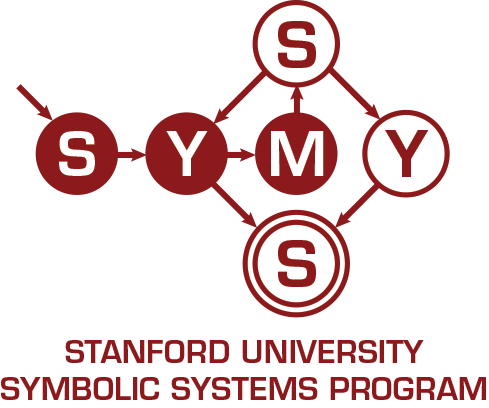Symposiums on Symbolic Systems and Society
The Symbolic Systems Program at Stanford University periodically hosts conferences, panels, and speaker events focusing on the relationships between symbolic systems and the social world. Starting in 2006, this series is formally named "Symposiums on Symbolic Systems and Society". These events are often organized in partnership with other organizations, and reflect a diversity of perspectives from both within and outside academia.
The most recent Symposium on Symbolic Systems in Society was...
The
Singularity Summit at Stanford
May 13, 2006
9:00 a.m. - 5:00 pm.
Memorial Auditorium
Stanford University
Previous special events under this theme have included:
Symbolic Systems Forum events under this theme have included:
- Paulina Borsook, Author, "Edict of Worms 2.0: A Skeptical Humanist Takes on the Libertarian Religion of Silicon Valley" (January 8, 2001)
- John Zerzan, Author, "Symbolic Thought and the Atrophy of Culture" (January 17, 2002)
- Geoff Nunberg, CSLI and Stanford
Humanities Center, "Faulty Filters: What to Do About `Rotten
Information' in the Digital Age?" (January 9, 2003)
- Chuck Carlson, History Department, "The Rise of Silicon Valley and Evolving Images of Technology, Globalization, and the Information Age" (April 3, 2003)
- Norman Nie, Political Science Department, "Unintended Social Consequences of the Internet: Surfing and Sociability--Where Does All the Time Come From? (November 20, 2003)
- Fred Turner, Communication Department, "Where the Counterculture Met the New Economy: Revisiting the WELL and the Origins of Virtual Community" (April 21, 2005)
- Jessica Riskin, History Department, "Mind Out of Matter: A History of the Quest for a Conscious Machine" (May 12, 2005)
- Jean-Pierre Dupuy, French and Italian Department, "Philosophical Foundations of NanoEthics" (May 19, 2005)
- Movie: Revolution OS (2001, Dir: J.T.S. Moore)
(October 13, 2005)
- Annalee Newitz, Author, "Free Speech Hackers: How New Laws and Technologies are Creating the Next Generation of Digital Subversives" (November 3, 2005)
- Geoff Morris, M.S. Candidate, Symbolic Systems Program, "Pockets: Visualizing Campaign Finance" (February 9, 2006)
- Hank Greely, Law School, "NeuroEthics:
Science, Ethics, and Law" (April 13, 2006)

 Symposiums_on_Symbolic_Systems_and_Society.html
Symposiums_on_Symbolic_Systems_and_Society.html